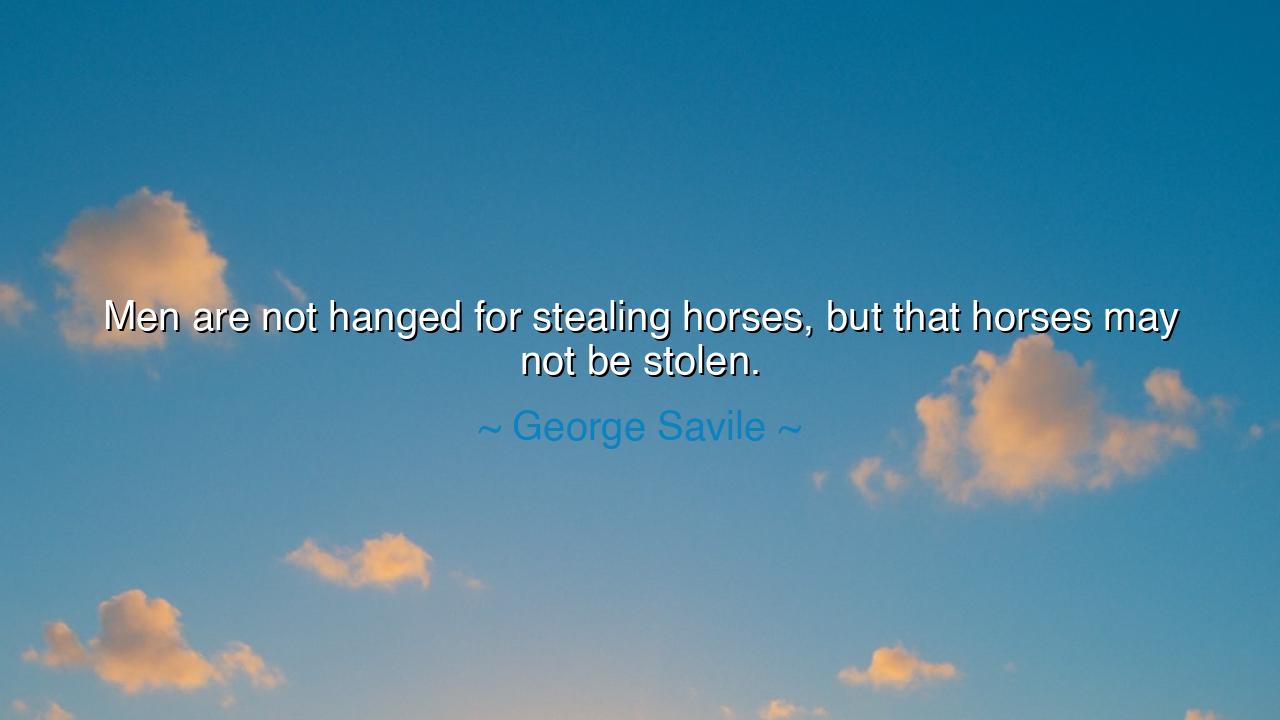
Men are not hanged for stealing horses, but that horses may not






Hear, O children of wisdom, the words of George Savile, a philosopher and statesman who saw the truth of human society with piercing clarity. He spoke thus: "Men are not hanged for stealing horses, but that horses may not be stolen." These words, though simple, speak to the very heart of justice and the nature of law. Savile reveals a profound insight into the world of authority and punishment, pointing out that punishment is not always for the crime itself, but for the sake of ensuring that society remains in order, that chaos does not prevail, and that the authority of the law is upheld.
In this statement, Savile is teaching us that justice is often more about maintaining control and ensuring the stability of society than about rectifying individual wrongs. The punishment of a crime is not just a response to the wrong committed, but a warning to all who might dare to defy the established order. In this case, the hanging of a thief is not merely to avenge the theft of a horse, but to send a message: such acts will not be tolerated, and the power of the law is absolute. The man who steals is punished not simply for the theft, but for the disruption of the peace and the challenge to the authority of society itself.
Consider, O children, the great Roman Empire, whose laws were often harsh and unforgiving. The punishment for slavery and rebellion was death, not just to avenge the crime but to maintain the integrity of the empire. When Spartacus and his army of slaves rose against the Romans, they were not simply punished for their revolt. The crucifixion of the rebels along the Appian Way was not just to punish them, but to strike fear into the hearts of others who might consider defying Rome. The Romans understood well the principle of deterrence: the punishment of the few serves to protect the many, and to uphold the power of the state.
This idea is echoed in the story of the French Revolution, where the guillotine became a symbol not just of justice but of fear and control. As the revolutionaries sought to rid France of its old tyrannical rulers, they used public executions to demonstrate their authority. The people were not hanged merely because they were guilty of treason or betrayal, but because the revolutionaries wanted to send a strong message to all those who might consider opposing the revolution: resistance will be met with swift and certain punishment. Through such acts, the revolutionaries sought not just justice, but the creation of a new order, one where the law would be feared and obeyed.
Savile’s words also speak to the nature of authority and the role of power in shaping society. Laws are not just about righting wrongs; they are about creating the framework within which society can function. The punishment of a theft, like the theft of a horse, serves as a reminder to all that no one is above the law, and that the sanction of punishment exists not for the act itself, but for the preservation of order and stability. Without the strength of law to protect property and to punish those who defy it, society would crumble into anarchy, where every man would take what he could, and chaos would reign.
The lesson here, O children, is one of understanding the purpose of justice and punishment. Laws are not simply created to punish crime, but to preserve order, to maintain peace, and to ensure that the balance of power remains in the hands of those who uphold the good of society. Justice must be firm, but it must also be understood as a means of preserving a greater good. When we enact laws, let us remember that their true purpose is not merely to punish, but to protect and preserve the peace of the community, and to ensure that society functions as a whole.
And so, O children, let us take this wisdom with us into our lives. In every action we take, every law we uphold, and every decision we make, remember that we must not only consider the individual consequences, but also the greater good of the whole. As we navigate the complexities of our world, let us not forget that the purpose of justice is not only to avenge the wrongs of the past but to preserve the stability of the future. May we live with this wisdom, understanding that true strength lies in our ability to uphold order and maintain peace for all.






AAdministratorAdministrator
Welcome, honored guests. Please leave a comment, we will respond soon